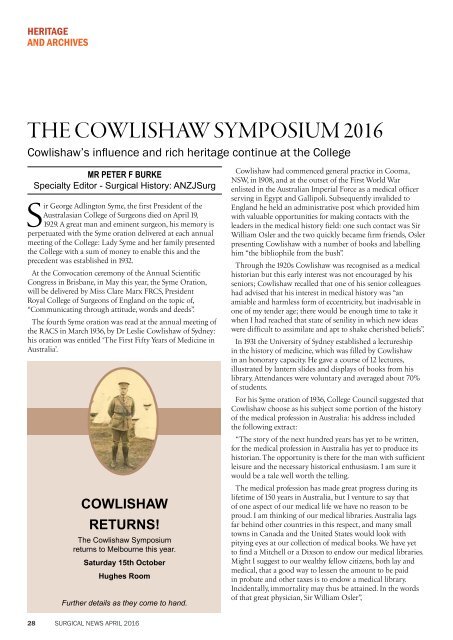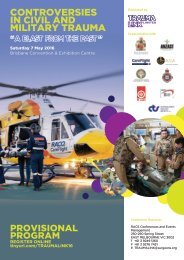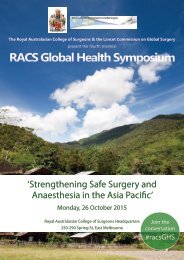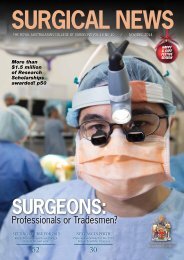Create successful ePaper yourself
Turn your PDF publications into a flip-book with our unique Google optimized e-Paper software.
HERITAGE<br />
AND ARCHIVES<br />
HERITAGE<br />
AND ARCHIVES<br />
THE COWLISHAW SYMPOSIUM 2016<br />
Cowlishaw’s influence and rich heritage continue at the College<br />
MR PETER F BURKE<br />
Specialty Editor - Surgical History: ANZJSurg<br />
Sir George Adlington Syme, the first President of the<br />
Australasian College of Surgeons died on April 19,<br />
1929. A great man and eminent surgeon, his memory is<br />
perpetuated with the Syme oration delivered at each annual<br />
meeting of the College: Lady Syme and her family presented<br />
the College with a sum of money to enable this and the<br />
precedent was established in 1932.<br />
At the Convocation ceremony of the Annual Scientific<br />
Congress in Brisbane, in May this year, the Syme Oration,<br />
will be delivered by Miss Clare Marx FRCS, President<br />
Royal College of Surgeons of England on the topic of,<br />
“Communicating through attitude, words and deeds”.<br />
The fourth Syme oration was read at the annual meeting of<br />
the RACS in March 1936, by Dr Leslie Cowlishaw of Sydney:<br />
his oration was entitled ‘The First Fifty Years of Medicine in<br />
Australia’.<br />
COWLISHAW<br />
RETURNS!<br />
The Cowlishaw Symposium<br />
returns to Melbourne this year.<br />
Saturday 15th October<br />
Hughes Room<br />
Further details as they come to hand.<br />
Cowlishaw had commenced general practice in Cooma,<br />
NSW, in 1908, and at the outset of the First World War<br />
enlisted in the Australian Imperial Force as a medical officer<br />
serving in Egypt and Gallipoli. Subsequently invalided to<br />
England he held an administrative post which provided him<br />
with valuable opportunities for making contacts with the<br />
leaders in the medical history field: one such contact was Sir<br />
William Osler and the two quickly became firm friends, Osler<br />
presenting Cowlishaw with a number of books and labelling<br />
him “the bibliophile from the bush”.<br />
Through the 1920s Cowlishaw was recognised as a medical<br />
historian but this early interest was not encouraged by his<br />
seniors; Cowlishaw recalled that one of his senior colleagues<br />
had advised that his interest in medical history was “an<br />
amiable and harmless form of eccentricity, but inadvisable in<br />
one of my tender age; there would be enough time to take it<br />
when I had reached that state of senility in which new ideas<br />
were difficult to assimilate and apt to shake cherished beliefs”.<br />
In 1931 the University of Sydney established a lectureship<br />
in the history of medicine, which was filled by Cowlishaw<br />
in an honorary capacity. He gave a course of 12 lectures,<br />
illustrated by lantern slides and displays of books from his<br />
library. Attendances were voluntary and averaged about 70%<br />
of students.<br />
For his Syme oration of 1936, College Council suggested that<br />
Cowlishaw choose as his subject some portion of the history<br />
of the medical profession in Australia: his address included<br />
the following extract:<br />
“The story of the next hundred years has yet to be written,<br />
for the medical profession in Australia has yet to produce its<br />
historian. The opportunity is there for the man with sufficient<br />
leisure and the necessary historical enthusiasm. I am sure it<br />
would be a tale well worth the telling.<br />
The medical profession has made great progress during its<br />
lifetime of 150 years in Australia, but I venture to say that<br />
of one aspect of our medical life we have no reason to be<br />
proud. I am thinking of our medical libraries. Australia lags<br />
far behind other countries in this respect, and many small<br />
towns in Canada and the United States would look with<br />
pitying eyes at our collection of medical books. We have yet<br />
to find a Mitchell or a Dixson to endow our medical libraries.<br />
Might I suggest to our wealthy fellow citizens, both lay and<br />
medical, that a good way to lessen the amount to be paid<br />
in probate and other taxes is to endow a medical library.<br />
Incidentally, immortality may thus be attained. In the words<br />
of that great physician, Sir William Osler”,<br />
“The organisation of a library<br />
means effort, it means union, it means<br />
progress. It does good to men who<br />
start it, who help with money, with<br />
time, and with the gift of books. It does<br />
good to the young men with whom our<br />
hopes rest, and a library gradually and<br />
insensibly moulds the profession of a<br />
town to a better and higher status”.<br />
Throughout his life Cowlishaw<br />
remained a student of medicine, as well<br />
as of its history, and in 1939 gained by<br />
examination, membership of the Royal<br />
Australasian College of Physicians.<br />
When Cowlishaw died on December<br />
11, 1943 his library was offered for sale<br />
by his trustees; by his will the Royal<br />
Australasian College of Physicians had<br />
the first refusal but decided not to buy<br />
it, although he had been their honorary<br />
librarian and had designed the College<br />
library to house his collection!<br />
Accordingly, the trustees were then<br />
prepared to hold the collection for any<br />
other institution and it was then that<br />
fate decreed that Kenneth Russell was in<br />
Sydney, on leave from the Army, when he<br />
learned of this opportunity.<br />
Russell immediately contacted the<br />
College Secretary, Gordon Wheeler,<br />
Program cover for the first<br />
Cowlishaw symposium<br />
Kenneth Fitzpatrick Russell<br />
and via him, made contact with Sir<br />
Alan Newton, PRACS 1943-1945,<br />
and succeeded in convincing him to<br />
make arrangements for the immediate<br />
purchase of the library.<br />
Apart from his writings and his<br />
persisting influence, Cowlishaw also<br />
left us a rich heritage, the library of<br />
his lifelong collecting, which was<br />
almost part of himself. The Cowlishaw<br />
Collection at the RACS is the main<br />
centre for the study of the history of<br />
medicine in Australia.<br />
The first Cowlishaw Symposium<br />
was held at the College on 26 October<br />
1996 and the Introduction noted: ‘The<br />
Cowlishaw Symposium is designed<br />
to make the College’s collection of<br />
historical volumes better known, both<br />
to Fellows of the College and to the<br />
wider bibliophile community’.<br />
October 15 2016 marks the staging<br />
of the eleventh biennial Cowlishaw<br />
Symposium: just one day in duration,<br />
invited speakers are chosen to present<br />
papers based on volumes contained<br />
within the collection.<br />
Fellows are strongly urged to consider<br />
attending; one day that could change<br />
your life and make for true ‘fellowship’.<br />
Your College has both a Curator and<br />
Archivist who are there to assist you<br />
with any research or gift enquiry: why<br />
not avail yourself of their expertise<br />
and arrange your own visit to this, our<br />
national treasure!<br />
28 <strong>SURGICAL</strong> <strong>NEWS</strong> APRIL 2016 <strong>SURGICAL</strong> <strong>NEWS</strong> APRIL 2016 29






